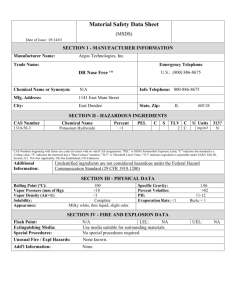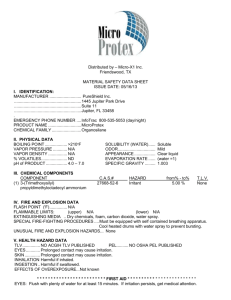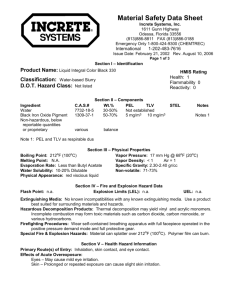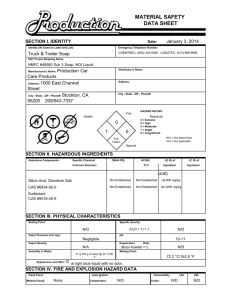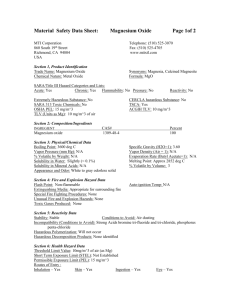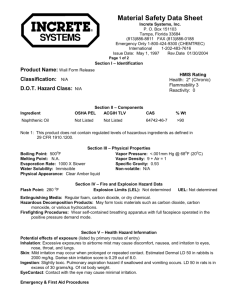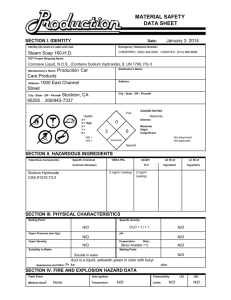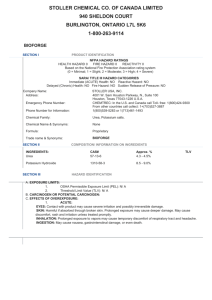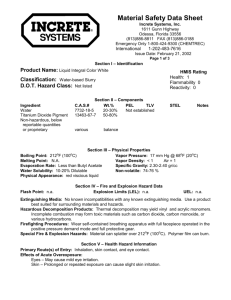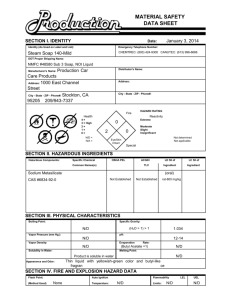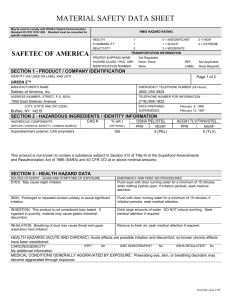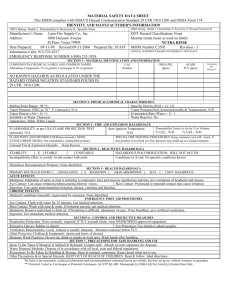Liquid Color Dispersion
advertisement
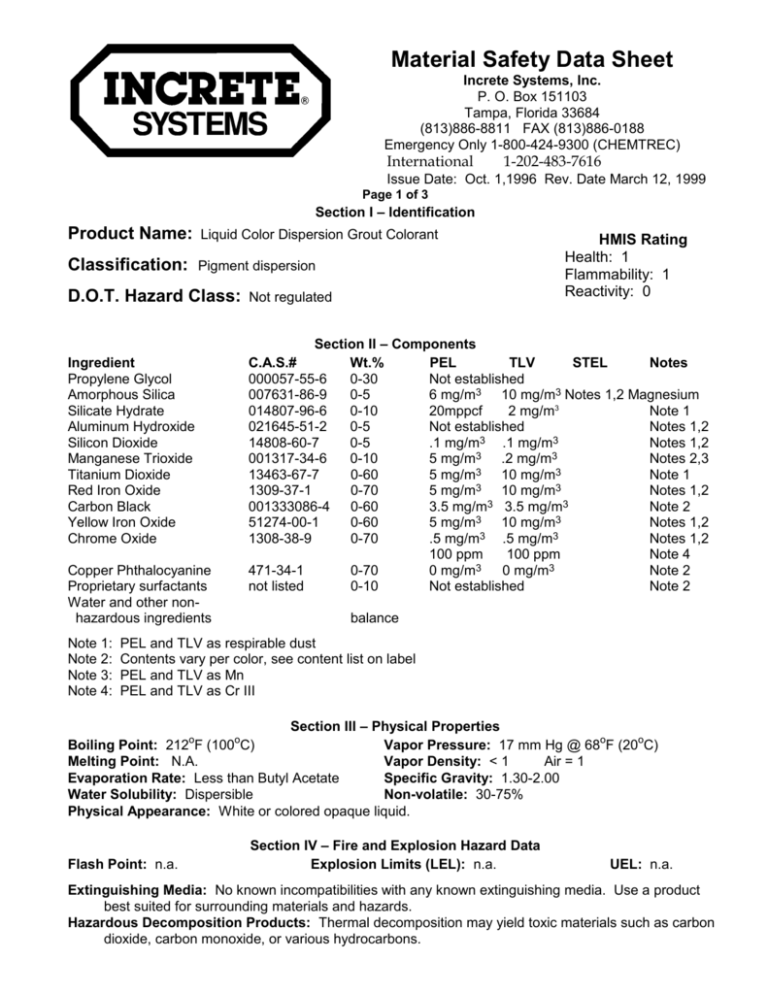
Material Safety Data Sheet Increte Systems, Inc. P. O. Box 151103 Tampa, Florida 33684 (813)886-8811 FAX (813)886-0188 Emergency Only 1-800-424-9300 (CHEMTREC) International 1-202-483-7616 Issue Date: Oct. 1,1996 Rev. Date March 12, 1999 Page 1 of 3 Section I – Identification Product Name: Liquid Color Dispersion Grout Colorant Classification: Pigment dispersion D.O.T. Hazard Class: Section II – Components C.A.S.# Wt.% PEL TLV STEL Notes 000057-55-6 0-30 Not established 007631-86-9 0-5 6 mg/m3 10 mg/m3 Notes 1,2 Magnesium 014807-96-6 0-10 20mppcf 2 mg/m3 Note 1 021645-51-2 0-5 Not established Notes 1,2 14808-60-7 0-5 .1 mg/m3 .1 mg/m3 Notes 1,2 001317-34-6 0-10 5 mg/m3 .2 mg/m3 Notes 2,3 13463-67-7 0-60 5 mg/m3 10 mg/m3 Note 1 1309-37-1 0-70 5 mg/m3 10 mg/m3 Notes 1,2 001333086-4 0-60 3.5 mg/m3 3.5 mg/m3 Note 2 3 3 51274-00-1 0-60 5 mg/m 10 mg/m Notes 1,2 1308-38-9 0-70 .5 mg/m3 .5 mg/m3 Notes 1,2 100 ppm 100 ppm Note 4 471-34-1 0-70 0 mg/m3 0 mg/m3 Note 2 not listed 0-10 Not established Note 2 Ingredient Propylene Glycol Amorphous Silica Silicate Hydrate Aluminum Hydroxide Silicon Dioxide Manganese Trioxide Titanium Dioxide Red Iron Oxide Carbon Black Yellow Iron Oxide Chrome Oxide Copper Phthalocyanine Proprietary surfactants Water and other nonhazardous ingredients Note 1: Note 2: Note 3: Note 4: Not regulated HMIS Rating Health: 1 Flammability: 1 Reactivity: 0 balance PEL and TLV as respirable dust Contents vary per color, see content list on label PEL and TLV as Mn PEL and TLV as Cr III Section III – Physical Properties Boiling Point: 212 F (100 C) Vapor Pressure: 17 mm Hg @ 68oF (20oC) Melting Point: N.A. Vapor Density: < 1 Air = 1 Evaporation Rate: Less than Butyl Acetate Specific Gravity: 1.30-2.00 Water Solubility: Dispersible Non-volatile: 30-75% Physical Appearance: White or colored opaque liquid. o Flash Point: n.a. o Section IV – Fire and Explosion Hazard Data Explosion Limits (LEL): n.a. UEL: n.a. Extinguishing Media: No known incompatibilities with any known extinguishing media. Use a product best suited for surrounding materials and hazards. Hazardous Decomposition Products: Thermal decomposition may yield toxic materials such as carbon dioxide, carbon monoxide, or various hydrocarbons. Liquid Color Dispersion MSDS, Page 2 of 3 Firefighting Procedures: Wear self-contained breathing apparatus with full facepiece operated in the positive pressure demand mode and full protective gear. Special Fire & Explosion Hazards: Material can splatter over 212oF (100oC). Section V – Health Hazard Information Primary Route(s) of Entry: Inhalation, skin contact, and eye contact. Effects of Acute Overexposure: Eyes – May cause mild eye irritation. Skin – Prolonged or repeated exposure can cause slight skin irritation. Respiratory – Inhalation of vapor or mist can cause irritation to upper respiratory tract. Ingestion – Single dose oral toxicity is low, and unlikely to occur with normal handling. Symptoms will include gastrointestinal irritation (nausea, vomiting, diarrhea). First Aid: Eyes – Flush gently with water for at least 15 minutes. If symptoms persist or vision is impaired, seek medical attention. Skin – Wash affected skin areas with soap and water. Seek medical attention if irritation persists. Respiratory – Remove individual to fresh air. If not breathing, give CPR. If breathing is difficult, give oxygen. Call a physician. Ingestion – If swallowed, give 2 glasses of water to drink. DO NOT induce vomiting. Consult a physician. Never give anything by mouth to an unconscious person. Section VI – Chemical Reactivity Stability: Material is stable at normal conditions. Hazardous Polymerization: Will not occur. Incompatibility: Oxidizing materials and strong acids. Conditions to Avoid: Extreme temperatures. Hazardous Decomposition Products: Section VII – Spill Procedures Small Spill: Absorb spilled material with inert material. Transfer material to a suitable container. Large Spill: Use personal protective equipment. Dike area to prevent material from entering soil, sewer or open water. Absorb spilled material with inert material. Transfer material to a suitable container. Waste Disposal Method: Dispose of material in a manner consistent with all local, state and federal regulations. For further information, contact your state or local waste agency or the United States Environmental Protection Agency's RCRA hotline (1-800-424-9346). Section VIII – Special Protection Information Respiratory Protection: None required under normal operating conditions. If material is sprayed, use an NIOSH-approved respirator. Ventilation: Mechanical ventilation not usually required, excepting indoor application with limited air exchange. Gloves: Neoprene gloves will provide protection against penetration. Eye Protection: Wear chemically-resistant goggles. Other Protective Equipment: Wear appropriate work clothing to prevent skin contact. Wash before reuse. Eye wash station should be available. Section IX – Special Precautions Handling and Storing: Store in a cool, dry place. Use appropriate protective gear when handling. Section X – Supplemental Information This product may contain substances subject to the requirements of SARA, Section 313, Title III: Liquid Color Dispersion MSDS, Page 3 of 3 Manganese compounds CAS # 001317-34-6 1-6% Chromium oxide CAS # 001308-38-9 1-70% SARA Section 311/312 Hazard Classification: Delayed (Chronic) Health Hazard This information is provided in good faith and is correct to the best knowledge of Inco Chemical Company, Inc. Inco Chemical Co., Inc. makes no representation as to its completeness or accuracy. Customers are encouraged to make their own determination as to the suitability of this product for their purpose prior to use. Inco Chemical Co., Inc. disclaims responsibility for damages of any kind resulting from the use of this information. No warranty of merchantability, fitness for use, or any other warranty is expressed or is to be implied regarding the accuracy of these data.
